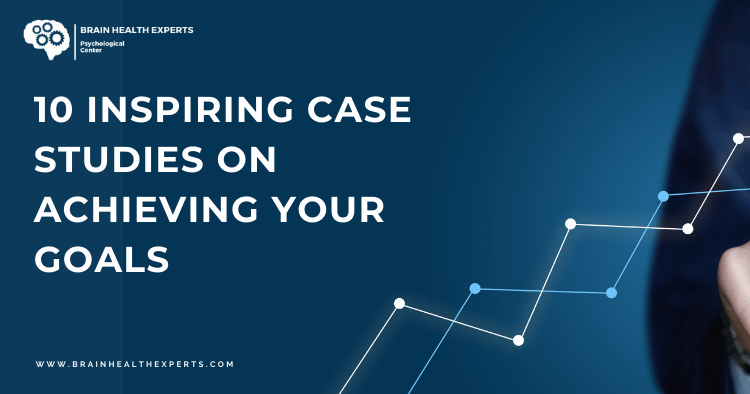Table of Contents
- Introduction
- 1. The Power of Mindfulness: Dr. Jon Kabat-Zinn
- 2. Neuroplasticity in Action: Dr. Michael Merzenich
- 3. Goal Setting with Grit: Angela Duckworth
- 4. The Habit Formation Approach: Charles Duhigg
- 5. Overcoming Adversity: Dr. Carol Dweck
- 6. The Power of Visualization: Dr. Jim Quick
- 7. Building Resilience: Dr. Rick Hanson
- 8. The Role of Nutrition: Dr. David Perlmutter
- 9. Sleep and Performance: Dr. Matthew Walker
- 10. The Science of Motivation: Dr. Edward Deci
- Conclusion
- FAQs
Introduction
Setting and achieving goals can often feel like an uphill battle. However, numerous brain health experts have demonstrated that with the right mindset and strategies, anyone can reach their aspirations. This comprehensive blog post delves into 10 inspiring case studies that harness the power of neuroscience, psychology, and personal resilience. Each case study highlights practical methods to achieve goals while enhancing brain health.
1. The Power of Mindfulness: Dr. Jon Kabat-Zinn
Dr. Jon Kabat-Zinn is the founder of Mindfulness-Based Stress Reduction (MBSR), a program that blends meditation and awareness techniques. His work emphasizes how mindfulness can reduce stress, enhance focus, and improve overall well-being.
Key Takeaways:
- Mindfulness Practice: Regular meditation sessions can improve attention and emotional regulation.
- Case Study: A group of patients with chronic pain reported a 40% reduction in pain levels after participating in an 8-week MBSR program.
Action Steps:
- Start with 10 minutes of daily mindfulness meditation.
- Use apps like Headspace or Calm for guided sessions.
For more on Dr. Kabat-Zinn’s work, visit Mindfulness-Based Stress Reduction.
2. Neuroplasticity in Action: Dr. Michael Merzenich
Dr. Michael Merzenich is a pioneer in the field of neuroplasticity, demonstrating how the brain can reorganize itself through experience and learning.
Key Takeaways:
- Brain Training: Engaging in cognitive exercises can enhance brain function.
- Case Study: Participants in a brain training program showed significant improvements in memory and attention over a 12-week period.
Action Steps:
- Incorporate brain games like Lumosity or Elevate into your daily routine.
Learn more about Dr. Merzenich’s findings at BrainHQ.
3. Goal Setting with Grit: Angela Duckworth
Angela Duckworth’s research on grit reveals that perseverance is a better predictor of success than talent. Her book, “Grit: The Power of Passion and Perseverance,” outlines how sustained effort is crucial for achieving long-term goals.
Key Takeaways:
- Grit Over Talent: Fostering a growth mindset can enhance resilience.
- Case Study: Students in challenging academic programs who displayed grit achieved higher GPAs than their more talented peers.
Action Steps:
- Set long-term goals and break them into smaller, manageable tasks.
- Reflect on your progress regularly to stay motivated.
For more insights, check out Duckworth’s TED Talk on Grit.
4. The Habit Formation Approach: Charles Duhigg
Charles Duhigg’s book, “The Power of Habit,” explains the science behind habit formation and how it can be leveraged for achieving goals.
Key Takeaways:
- Habit Loop: Understanding the cue-routine-reward cycle can help in forming new habits.
- Case Study: A corporate team implemented new productivity habits, leading to a 20% increase in efficiency.
Action Steps:
- Identify cues that trigger your habits and modify them for positive change.
Learn more about Duhigg’s methodologies at Charles Duhigg.
5. Overcoming Adversity: Dr. Carol Dweck
Dr. Carol Dweck’s research on fixed vs. growth mindsets demonstrates how our beliefs about our abilities can influence our success.
Key Takeaways:
- Growth Mindset: Embracing challenges leads to greater achievement.
- Case Study: Students taught a growth mindset showed improved academic performance compared to their peers.
Action Steps:
- Challenge yourself with new experiences and view failures as learning opportunities.
To delve deeper into Dweck’s theories, visit Mindset Works.
6. The Power of Visualization: Dr. Jim Quick
Dr. Jim Quick is an expert in memory improvement and brain optimization. His techniques include visualization, which aids in goal achievement by creating a mental image of success.
Key Takeaways:
- Visualization Techniques: Regularly visualize your goals; this can significantly enhance motivation and clarity.
- Case Study: Athletes who used visualization techniques improved their performance by up to 30%.
Action Steps:
- Spend a few minutes daily visualizing your goals and the steps needed to achieve them.
Explore more about his strategies at Quick Learning.
7. Building Resilience: Dr. Rick Hanson
Dr. Rick Hanson focuses on how to cultivate resilience and well-being through positive psychology.
Key Takeaways:
- Positive Experiences: Taking time to notice and internalize positive experiences can enhance resilience.
- Case Study: Participants in his programs reported a 50% higher resilience score after practicing gratitude and mindfulness.
Action Steps:
- Keep a daily gratitude journal to foster a positive outlook.
For additional resources, check out Rick Hanson’s Website.
8. The Role of Nutrition: Dr. David Perlmutter
Dr. David Perlmutter emphasizes the connection between nutrition and brain health. His books, including “Grain Brain,” argue that diet plays a crucial role in cognitive function and emotional well-being.
Key Takeaways:
- Brain-Healthy Foods: Omega-3 fatty acids, antioxidants, and whole foods support brain function.
- Case Study: A group following a Mediterranean diet showed improved cognitive scores over one year.
Action Steps:
- Incorporate more fruits, vegetables, and healthy fats into your diet.
For more on brain health and nutrition, visit Dr. Perlmutter’s Site.
9. Sleep and Performance: Dr. Matthew Walker
Dr. Matthew Walker’s research highlights the critical role of sleep in achieving goals and enhancing cognitive function.
Key Takeaways:
- Sleep Hygiene: Quality sleep is essential for memory consolidation and creativity.
- Case Study: Participants who improved their sleep hygiene experienced a 20% increase in productivity.
Action Steps:
- Aim for 7-9 hours of quality sleep each night and establish a calming bedtime routine.
Learn more about sleep science at Matthew Walker’s Site.
10. The Science of Motivation: Dr. Edward Deci
Dr. Edward Deci’s research on intrinsic and extrinsic motivation provides insights into what drives us to achieve our goals.
Key Takeaways:
- Intrinsic Motivation: Fostering a sense of autonomy and mastery leads to sustained motivation.
- Case Study: Employees motivated by intrinsic factors showed a 30% increase in job satisfaction and productivity.
Action Steps:
- Set goals that align with your passions and values to enhance motivation.
Discover more about Deci’s work at Self-Determination Theory.
Conclusion
Achieving your goals is not just about hard work; it’s about understanding how your brain functions and leveraging that knowledge. By integrating practices from these ten inspiring experts, you can enhance your goal-setting strategies, improve your brain health, and ultimately reach your aspirations. Remember, the journey is just as important as the destination—embrace it!
FAQs
Q: What is the best way to set achievable goals?
A: Use the SMART criteria (Specific, Measurable, Achievable, Relevant, Time-bound) to define your goals clearly.
Q: How can I stay motivated while working towards my goals?
A: Regularly remind yourself of your “why,” celebrate small wins, and surround yourself with supportive people.
Q: Can nutrition really affect my





